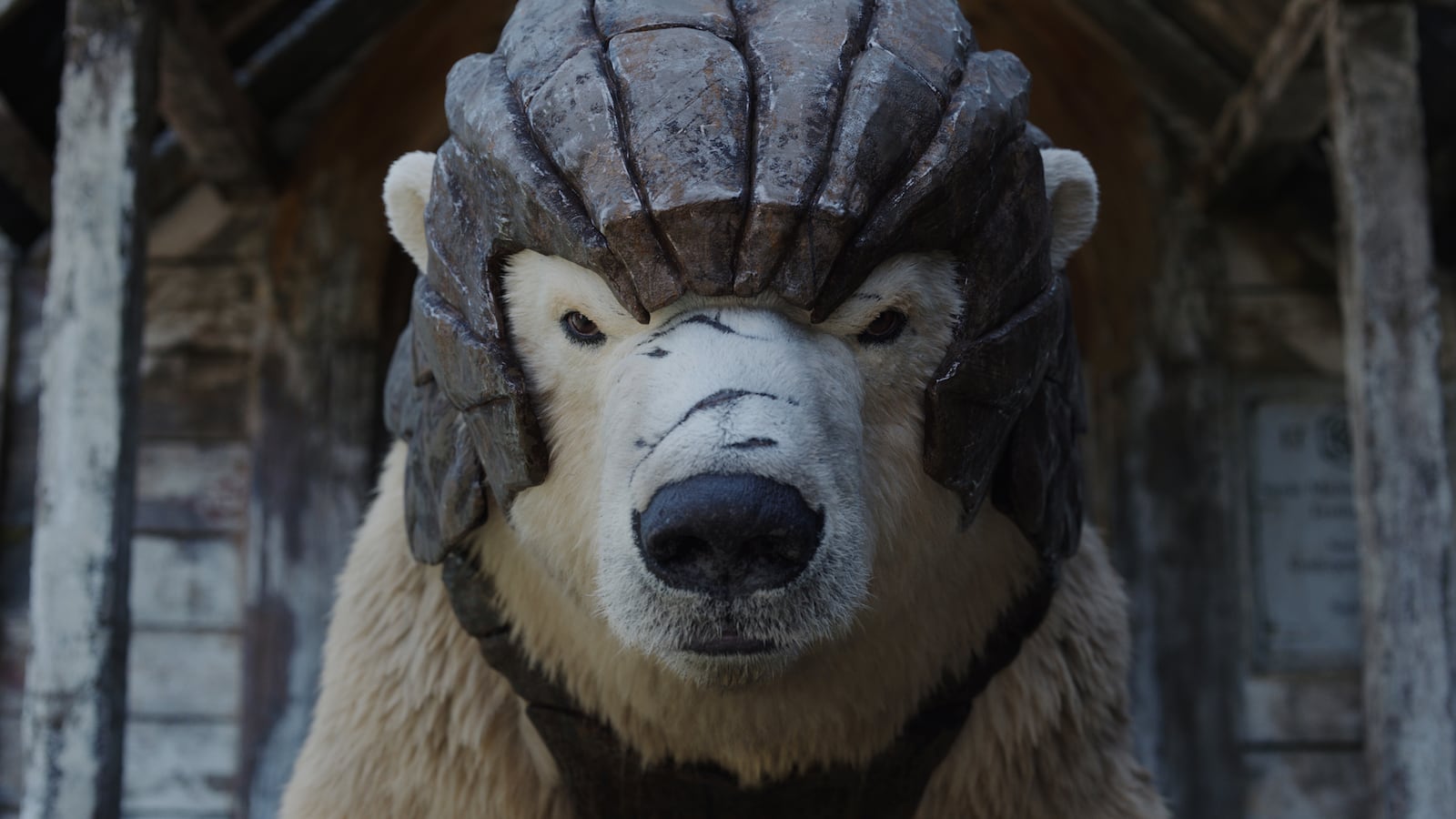I have not read any of Philip Pullman’s books, but a friend has told me the British author is known—and sometimes criticized—for his commitment to world-building.
His Dark Materials, the new HBO series based on Pullman’s trilogy of the same name, clearly abridges the books and prefers to delve into ideas, relationships, and atmosphere in real time rather than history or background, to varying effect. In the four episodes provided to press, there is very limited exposition—newcomers to Pullman’s work will have to wait to find out how exactly the world works and why, or they might observe and guess as they go along. Still, the complex world Pullman outlines throughout his trilogy seems to find ways into the story, though Jack Thorne’s script often paces through it frantically. It makes for complicated viewing: The show, so far, has its bright spots, but often it’s unclear what the focus is.
The first book in Pullman’s His Dark Materials trilogy, Northern Lights (or The Golden Compass in the U.S.) was adapted in 2007 as the film The Golden Compass, written and directed by Chris Weitz and starring Nicole Kidman, Daniel Craig, and Eva Green. While not a critical or commercial success, the film was Oscar-nominated for its visual effects. His Dark Materials, the HBO series, is an adaptation of all three novels in the series, and stars Ruth Wilson, James McAvoy, and Lin-Manuel Miranda. The series, which is said to be modernized from the book (for example, instead of a Victorian aesthetic there is more of a mid-century feel), also takes great care with visual effects: The daemons—animals that are tethered (by proximity) to each human and represent their souls—are the show’s standouts. Voiced by compelling and playful actors like Helen McCrory and Cristela Alonzo, they are given ample life and personality in their speech and movement without teetering into absurdity.
Animals, brought to life by VFX, are not only the literal souls of the show—they, along with the actors who voice them, provide relief from some of the more overwrought physical human performances (for instance, McAvoy as Lord Asriel and Miranda as Lee Scoresby) and make it easier to connect to the story amidst a torrent of action.
Thorne’s teleplays give the animals room to develop, but hew toward the anthropocentric, highlighting themes of family, inheritance, class, and honor. The show’s main protagonist, a smart and mischievous orphan girl named Lyra, played by Dafne Keen from Logan, must discover where she comes from in order to see through a difficult journey with the help of a group of warm yet fiercely protective vagabonds somewhat unfortunately called the Gyptians (seemingly derived from “Egyptian” and the slur often used to designate Roma people). Her obstacles include well-meaning and nefarious adults alike who have achieved some post within the establishment, whether it’s her tutors at Oxford’s Jordan College (the always wonderful Clarke Peters plays the head of the college)—which took her in as a baby at her explorer uncle Lord Asriel’s behest—or her mysterious new companion, Mrs. Coulter (Ruth Wilson), who holds a role within the Magisterium, the shady theocracy that rules over Britain (Pullman is an avowed atheist).
After a confusing stretch of events at Oxford, we see a coming-of-age ceremony, where a boy sees his daemon fixed. That’s nothing to do with reproductive organs—instead of changing between different forms, the daemon settles on the animal it will forever embody. For the boy, Tony Costa, it is a hawk. The same night, his little brother, Billy, is abducted. This is where the story jolts into action. Not long after Billy’s disappearance, Lyra’s best friend and fellow Orphan, Roger, is taken, too. Roger isn’t a scholar-in-training like Lyra but a servant at the college. He looks up to Lyra and is her confidant.
That the abducted children all come from relative poverty is never overtly noted but is a clear hinge in the plot. The Gyptians turn out to be the only people Lyra can trust to help her save her friend, and Thorne’s script locates this trustworthiness in the Gyptians’ collective sense of loyalty and morality. The other adults Lyra knows are hierarchical, and keep her in the dark about her own circumstances—the Gyptians take her seriously and tell her things. It’s not a groundbreaking dichotomy, and many other fantasy plots and children-focused stories make the same point about condescending adults, but the idea that DIY boat-dwelling nomads with little money and lax attitudes about marriage would make better guardians and teachers than Oxford professors and high-society professionals is quite a departure from the typical fantasy plots focused on orphan children like, say, Harry Potter. Lyra, rather than leaving behind a grubby upbringing for something more rigorous or glamourous, in fact leaves rigor and glamour behind for the urgency of the real world and her moral obligations to other people.
His Dark Materials is best where it engages with Lyra’s growing consciousness around class, authority, and community, and struggles when it tries to make something of Lord Asriel and Mrs. Coulter’s internal dramas. As the two shiny adults in the series, they represent danger, intrigue, and mystery. They have money, resources, connections, and secrets, and both McAvoy and Wilson don’t let you forget the latter, not for one second. This may sound like a strange critique, but it would have made sense to cast these characters as less virile and sexy. Along with some of the other slinky-rich adults in the show, it seems that Asriel and Coulter are starring in a psychosexual drama entirely disconnected from Lyra and the Gyptians. This may, for the showrunners, be the point, but it is more often a distraction. The powerful seem to be deeply insecure in their power, wielding it at the strangest moments and in the most flagrant ways, yet we are meant to see them as great, cunning threats. Lyra, for all her troublemaking, is much more convincing in her authority. And when she joins the Gyptians, with an array of animals alongside them, the show finally starts to go somewhere.


